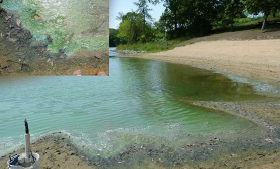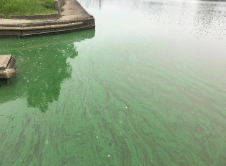SPRINGFIELD – As temperatures begin to rise, the Illinois Environmental Protection Agency and Department of Public Health are reminding residents to be cautious if they are planning activities on Illinois lakes and rivers, now and throughout the summer. Water conditions are ideal for blue-green algae growth. Blue-green algae (also known as cyanobacteria) are microscopic organisms that naturally occur in lakes and streams. Rapid growth of algae is referred to as a “bloom.” While most blue-green algae are harmless, some can produce toxic chemicals that cause sickness or other health effects in people and pets, depending on the amount and type of exposure.
Sensitive individuals, including young children, the elderly, and people with compromised immune systems are most at risk to adverse health effects attributable to algal toxins. Individuals are most often exposed to algal toxins while swimming or participating in other recreational activities in and on the water. The most common routes of exposure are direct skin contact, accidental ingestion of contaminated water, or accidental inhalation of water droplets in the air. Symptoms of exposure to algal toxins include rashes, hives, diarrhea, vomiting, coughing, or wheezing. More severe symptoms may result from longer or greater amounts of exposure.
People who plan to recreate in or on Illinois lakes or rivers this summer are advised to avoid contact with water that:
• looks like spilled, green or blue-green paint;
• has surface scums, mats, or films;
• is discolored or has green-colored streaks; or
• has greenish globs suspended in the water below the surface.
People are also advised to keep children and pets out of the water. Do not allow pets to drink from the water and do not allow them to lick their fur after swimming in water containing a blue-green algae bloom. If you or your pet has contact with water you suspect may have a blue-green algae bloom, rinse off with clean, fresh water as soon as possible.
Activities near, but not in or on a lake or river, such as camping, picnicking, biking, and hiking are not affected. With all activities, wash your hands before eating if you have had contact with lake water or shore debris.
If you are concerned you have symptoms that are a result of exposure to algal toxins, contact your health care provider or call the Illinois Poison Center at 1-800-222-1222. If your pet experiences symptoms that may be a result of exposure, contact your veterinarian.
For additional information about harmful algal blooms, please visit:
Illinois Environmental Protection Agency Harmful Algal Bloom website: https://www2.illinois.gov/epa/topics/water-quality/monitoring/algal-bloom/Pages/default.aspx
USEPA’s Cyanobacterial Harmful Algal Blooms website: https://www.epa.gov/cyanohabs

Above pictures are examples of blue-green algae blooms in Illinois lakes.

